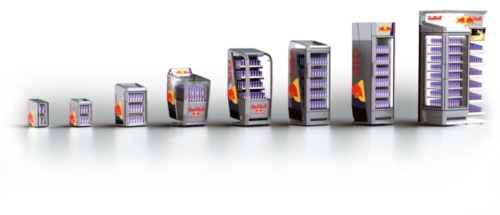Red Bull Eco-Cooler Technology

In recent years Red Bull has started the changeover to ECO-Coolers for the cooling of its beverages. The gradual shift to ecologically efficient cooler units and refrigerants is already a fixed component of Red Bull’s environmental policy. Red Bull shows its commitment to environmentally-friendly cooling with its membership in the initiative “Refrigerants, Naturally!” since May 2011.
ECO-Coolers can combine the use of hydrocarbons (R290 and R600a) and cooler technical improvements, such as energy efficient fans. Those coolers consume up to 45% less energy than previous generations of cooling equipment. With Red Bull ECO models, an average energy saving of 23% compared to other conventional refrigerators has been achieved. This change minimizes the global warming potential (GWP) of the refrigerant by a factor of 70 to 200.
Fluorescent tubes have been replaced by LED lighting. LEDs consume 70% less energy than light bulbs, as they do not generate as much waste heat and thus do not require any additional cooling. Moreover, the longer product lifecycle of LEDs reduces both waste and energy consumption. Furthermore, we have published a Cooler handbook with great best practice examples and guidelines explaining the efficient use of our refrigerants. The guidelines and the manual issued ensure proper handling of the coolers; guarantee that they are installed at the best place in shops, bars and clubs and offer best practice examples on maintenance. The aim is to increase the product lifecycle through better servicing and further optimize energy consumption. Red Bull established its business 26 years ago in Austria. Nowadays, Red Bull Energy Drink is available in more than 165 countries and sold more than 5.2 billion times a year.
Red Bull is very aware of its environmental responsibility, and is constantly striving for improvement in this area, with the aim to keep environmental impact at an absolute minimum. Therefore, we analyze our complete value chain and optimize with the intent to reduce our environmental footprint constantly. Cooling can be responsible for up to 20% of our Product Carbon Footprint. Based on favorable CO2 emissions data, Red Bull’s ordering guidelines guarantee that wherever feasible, from a legal and technical point of view, only ECO-Coolers will be installed in the future. As of 2013, there were 700,000 ECO-Coolers in use worldwide, representing more than 50% of Red Bull’s entire fleet of cooling equipment.